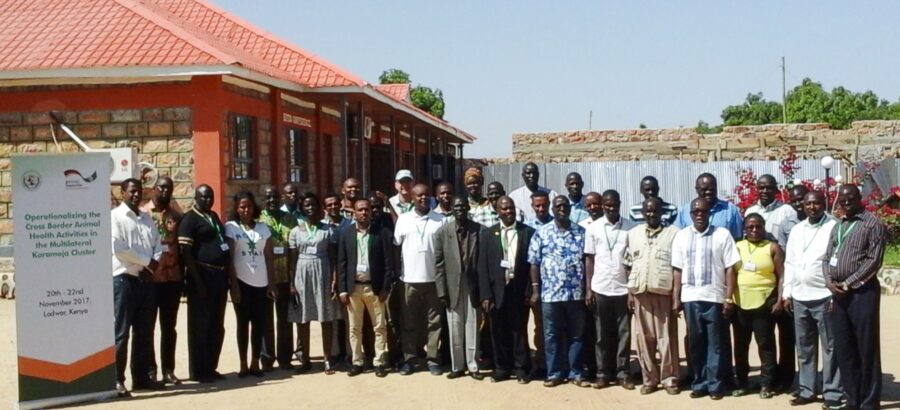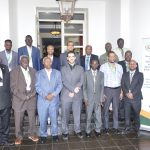Introduction
A draft multilateral MOU between Ethiopia, Kenya, South Sudan and Uganda seeks to harmonize some cross border animal health activities and natural resources. As per the MoU scope of cooperation, the activities to be addressed include; harmonized disease surveillance, harmonized vaccinations and treatments, animal health information system, timely disease reporting and information exchange, mapping of stock routes and natural resources, management of livestock movements and awareness creation on animal health issues among communities to mitigate the ravages of the cyclic drought in the cluster. The GIZ funded three days planning workshop sought to prioritize transboundary animal diseases (TADs) for synchronized surveillance/ vaccination, supportive treatment and rehabilitation of rangelands along the five common borders of the four countries.
The meeting took place from 20-22nd November, 2017 in Lodwar, Kenya. It was attended by participants from the Directorates of Veterinary Services; national RPLRP coordinators; development partners including community based organizations; international NGOs active in animal health activities; FAO Kenya, Turkana office; cross border development fund unit, Moroto office; GIZ, Turkana office; Tuft University consultant, community elders and IGAD/ICPALD. The participants from the Karamoja cluster were drawn from; Turkana and West Pokot counties (Kenya), Eastern Equatoria (South Sudan), Karamoja (Uganda) and Southern National Nationalities Peoples Republic (SNNPR) (Ethiopia).
The workshop was officially opened by Dr. Michael Cheruiyot, the representative of Kenya Chief Veterinary Officer. The latter was optimistic of the planning workshop to identify key intervention activities across the five common borders between the four countries that can be implemented jointly in order to build the resilience of the vulnerable communities through effective and efficient management of TADs and natural resources that go hand in hand during livestock mobility as livestock copying survival mechanisms during dry seasons. Others who addressed the meeting included Dr. Wamalwa Kinyanjui on behalf of ICPALD, Director; Dr. Asmamaw Duresa, representative of Ethiopia CVO; Dr. Deo Ndumu, representative of Uganda CVO and Dr. Alor Kwaje, representative of South Sudan CVO. All expressed appreciation about the planning meeting to ensure that the animal health and range management activities as per the scope of cooperation in the multilateral MoU are implemented on the ground for the benefit of the communities.
Main recommendations included:
- Despite the fact that Kween District is not ASAL, it should be considered in the implementation framework under the Karamoja cluster since it serves as a migratory route for livestock towards Karamoja region during drought in search of water and pasture. The district is prone to outbreaks of TADs and excess pressure to its natural resources
- During the launch and dissemination of the implementation framework and governance structure, the lower Government Administrators (governors (Kenya and S. Sudan), chief administrative officers (Uganda), regional federal officers (Ethiopia)) should be looped in to ensure smooth and coordinated implementation of priority identified in their areas of jurisdiction
- Implementing parties and IGAD/ICPALD should strengthen and equip the regional laboratories serving the Cross border Areas in terms of human capacity development, supply of reagents/ other hardware and Software in addition to shipment of samples
- The party countries should adapt risk based approach to disease control including vaccination programs in identified hot spots to target more than 90% of the population at risk to achieve at least 80% of herd immunity instead of mass vaccination that often yield little impact
- MoU signatory parties (ET-KE-SS-UG) in partnership with development partners should procure vaccines for prioritized diseases as per Cluster, facilitate vaccination and offer supportive treatment alongside
- MoU signatory parties (ET-KE-SS-UG) in partnership with implementing organizations such as NGOs, IGAD/ICPALD, FAO etc should proceed with rehabilitation of the identified rangelands in each Cluster
- Coordination mechanism by IGAD in the cluster should be strengthened in terms of regular planning/coordination meetings, communication and information sharing
ICPALD/IGAD expresses its appreciation to GIZ for funding this activity






